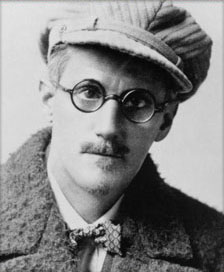In a whisper Mr Cunningham drew Mr Kernan’s attention to Mr Harford, the moneylender, who sat some distance off, and to Mr Fanning, the registration agent and mayor maker of the city, who was sitting immediately under the pulpit beside one of the newly elected councillors of the ward. To the right sat old Michael Grimes, the owner of three pawnbroker’s shops, and Dan Hogan’s nephew, who was up for the job in the Town Clerk’s office. Farther in front sat Mr Hendrick, the chief reporter of The Freeman’s Journal, and poor O’Carroll, an old friend of Mr Kernan’s, who had been at one time a considerable commercial figure. Gradually, as he recognised familiar faces, Mr Kernan began to feel more at home. His hat, which had been rehabilitated by his wife, rested upon his knees. Once or twice he pulled down his cuffs with one hand while he held the brim of his hat lightly, but firmly, with the other hand.
A powerful-looking figure, the upper part of which was draped with a white surplice, was observed to be struggling up into the pulpit. Simultaneously the congregation unsettled, produced handkerchiefs and knelt upon them with care. Mr Kernan followed the general example. The priest’s figure now stood upright in the pulpit, two-thirds of its bulk, crowned by a massive red face, appearing above the balustrade.
Father Purdon knelt down, turned towards the red speck of light and, covering his face with his hands, prayed. After an interval, he uncovered his face and rose. The congregation rose also and settled again on its benches. Mr Kernan restored his hat to its original position on his knee and presented an attentive face to the preacher. The preacher turned back each wide sleeve of his surplice with an elaborate large gesture and slowly surveyed the array of faces. Then he said:
“For the children of this world are wiser in their generation than the children of light. Wherefore make unto yourselves friends out of the mammon of iniquity so that when you die they may receive you into everlasting dwellings.”
Father Purdon developed the text with resonant assurance. It was one of the most difficult texts in all the Scriptures, he said, to interpret properly. It was a text which might seem to the casual observer at variance with the lofty morality elsewhere preached by Jesus Christ. But, he told his hearers, the text had seemed to him specially adapted for the guidance of those whose lot it was to lead the life of the world and who yet wished to lead that life not in the manner of worldlings.
It was a text for business men and professional men. Jesus Christ, with His divine understanding of every cranny of our human nature, understood that all men were not called to the religious life, that by far the vast majority were forced to live in the world and, to a certain extent, for the world: and in this sentence He designed to give them a word of counsel, setting before them as exemplars in the religious life those very worshippers of Mammon who were of all men the least solicitous in matters religious.
He told his hearers that he was there that evening for no terrifying, no extravagant purpose; but as a man of the world speaking to his fellow-men. He came to speak to business men and he would speak to them in a businesslike way. If he might use the metaphor, he said, he was their spiritual accountant; and he wished each and every one of his hearers to open his books, the books of his spiritual life, and see if they tallied accurately with conscience.
Jesus Christ was not a hard taskmaster. He understood our little failings, understood the weakness of our poor fallen nature, understood the temptations of this life. We might have had, we all had from time to time, our temptations: we might have, we all had, our failings. But one thing only, he said, he would ask of his hearers. And that was: to be straight and manly with God. If their accounts tallied in every point to say:
“Well, I have verified my accounts. I find all well.”
But if, as might happen, there were some discrepancies, to admit the truth, to be frank and say like a man:
“Well, I have looked into my accounts. I find this wrong and this wrong. But, with God’s grace, I will rectify this and this. I will set right my accounts.”
The End
